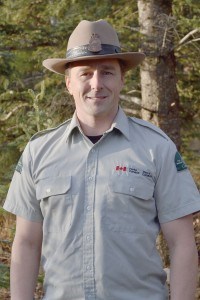
On a Friday afternoon, Oct. 24, Park Warden Joe Storms trudges through the brush just outside the Jasper townsite. He's on a standard patrol, keeping his eyes peeled for illegal campers, evidence of bush parties, or any other suspicious activity.
Storms is dressed in what can best be described as a beefed-up Parks Canada uniform. He wears the same colours as most park employees, but sports a bulletproof vest underneath his shirt and a utility belt and handgun on his waist.
He carries himself with the same steady poise all law enforcement officials do, and projects a friendly, easy-going demeanor.
Park wardens are essentially police officers of the woods. They're peace officers under the Criminal Code of Canada, and in national parks have essentially the same power as RCMP officers.
However, since the wardens' power is derived from the Canada National Parks Act, their mandate is different than the police. Storms said he can give out speeding tickets, make arrests and book criminals—but he generally leaves that stuff to the cops.
While RCMP focuses its law enforcement mainly on the townsite and highways, he focuses on the rest of the park.
This means it's not uncommon for Storms to strap on a pair of skis and cruise the cross country trails, hop on a mountain bike to scope out the Pyramid Bench, or trudge through the woods surrounding the townsite trying to ferret out illegal campers.
Once in a while wardens will even strap on a pack and head out on a multi-day trek through the backcountry, or climb on a horse and head to the northern reaches of the park boundary.
“In mountain terrain you need a broad set of skills, just to...” he stopped to think for a second, “not get yourself killed,” he said with a laugh.
And while mountain survival and law enforcement skills sit at the top of that list, psychological health is important as well. As with any law enforcement job, Storms has witnessed some traumatizing things during his 14 years as a warden.
As he ducked under a hanging branch, he reflected on a particularly tough incident that still sticks out in his mind.
He still remembers the date. July 4, 2001. It was his first year as a warden in Jasper, and he was heading home after a day trip along Wilcox Pass, at around 4:30 in the afternoon.
“I was thinking it was the end of my day. So I was heading home when the call came in,” Storms remembered.
Someone had fallen into a crevasse, since Storms was close by he was the first on the scene. A nine-year-old boy was dead. Storms said he still remembers passing the incredibly distraught father on his way to the site.
“Those things, you know, you play in your mind what could I have done differently? Regardless of who it is, that stuff is always there.”
Storms speaks thoughtfully, often pausing for long stretches before answering a question. He said that despite some of the difficult things he has seen, he feels incredibly lucky to have the job he does.
“A lot of it is just the knowing that you have been given a job that very few people have the opportunity to do,” he said. “Just to be one of six people here in Japer is a pretty special privilege, and that is something that I absolutely don't take for granted.”
It takes a unique blend of law enforcement and outdoor survival skills to be a good warden, and the application process is extensive and difficult.
In order to even make it to training, new recruits have to go through a multi-stage application that includes a Physical Abilities Requirement Evaluation, as well as a psychological, physical and medical assessment.
New wardens are trained at the Depot Division of the RCMP academy in Regina, but since their mandate is different their program is slightly altered.
Patrols are a pretty big part of a warden's job, but no two days are the same, and that is by design. Being law enforcement, Storms and the other wardens don't want to be predictable.
“The big thing is we need to go where the people are,” Storms said as he trundled in his Parks Canada SUV up Old Fort Point Road.
“The park is 11,000 square kilometres, so it's a pretty big place,” he explained, craning his neck to check out a suspiciously parked car. “We have close to 300 kilometres of road—so just roads in itself is massive—and then we have the trail network, which I don't even want to guess at how long it is.”
Environmental factors play a big part in where wardens go. Depending on things like weather, recent trends in crime and what areas of the park are popular, Storms' day could look completely different.
In the summer, for example, he spends a lot of time looking for illegal fires and campsites. In the winter, he's more likely to cruise through the park's cross-country trails.
In the end, first and foremost he sees his job as protecting the park and the people in it. It's just a huge bonus, he said, that he gets to be surrounded by a beautiful environment as he does it.
“We all love the park, [and] the opportunity to watch nature unfold is pretty spectacular,” he said.
Trevor Nichols
[email protected]
